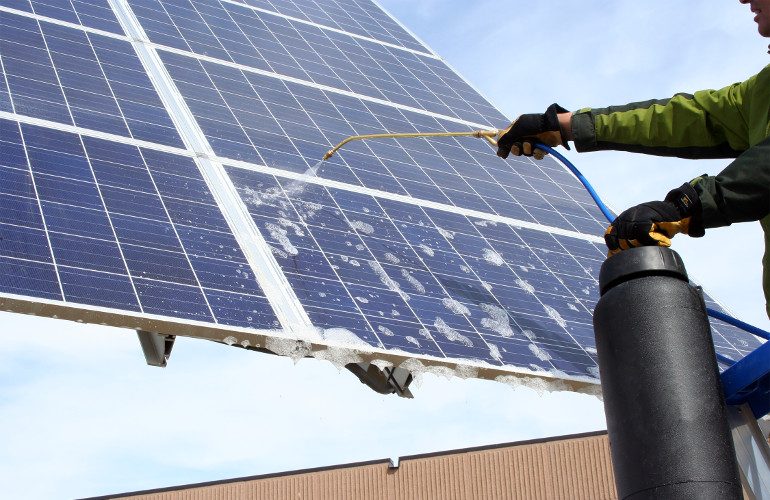Table of Contents
ToggleIt comes as no surprise that anything which is exposed to the outside environment all day long will get dirty. The same goes for solar panels.
If you have a rooftop solar panel installed in your building, many of you won’t bother to clean it unless it gets a serious amount of dirt accumulated and starts showing reduced efficiency.
The question of whether you need to clean your solar power system or not depends on a variety of factors such as the weather, location, and the setting angle at which they are placed etc.
However, irrespective of how clean your surroundings are, the panels do get dirty. In this article, we deal with a list of things to consider while cleaning solar panels.
Do you need to clean the solar panels?
In most of the cases, it is not necessary to clean them very frequently as all the accumulated waste will get naturally washed off when it rains or during a strong breeze.
But there are times in which it makes a lot of sense to clean the panels. Say for example if you get a lot of bird droppings on your panel, it will be a better idea to wash them off rather than to wait for rains to come down.
Also if you live in a place of scanty rainfall, it will be probably a good idea to clean your panels every once in a while.
Common blockers on solar panels
Not getting optimum efficiency out of your solar cells? Check out the following blockers:
1. Water, leaves and dust
Often the amount of sunlight falling on a solar panel will be blocked due to the effect of dust, leaves or water. That said, a small amount of dust won’t have much effect as it can still let a lot of light through, and when it rains, it will naturally be washed away.
More care needs to be taken if your panels are installed close to the main road or farmland.
Studies by the US National Renewable Energy Laboratory (NREL) have indicated that if the solar panels are not cleaned regularly, there will be an energy loss of 30 per cent per year.
Leaves also play a significant role in blocking the amount of sunlight falling on the solar panels.
Due care has to be taken if you have trees surrounding the panels and the leaves falling on the panel needs to be removed regularly. You could also cut off branches of the trees which are towards the panels.
2. Bird dropping
If you have many trees surrounding your solar panels, it will naturally attract a lot of birds. Bird droppings will adhere on the surface of the panels and won’t be easily washed away even when rainwater falls on it.


Source: Solar quotes
Bird droppings also affect the proper functioning of string inverter or micro-inverter. The inverter will stop showing the current flow during these instances.
The angle of incidence of solar panels also determines its self-cleaning ability. If you have angled panels, the water and the dust will flow down due to gravity.
For flat panels, more intensive cleaning is required as the water and dirt won’t flow down easily and secondly, the rainwater will mix up with the dirt and leave a muddy patch.
The right way to clean your solar panels
There are no hard and fast rules when it comes to cleaning the solar panels. Solar panels differ mainly due to its build and the manufacturer.
Different solar panel manufacturers will advise different forms of cleaning methods. It will be a good idea to check with the manufacturer in determining the most suitable method to clean your panels
Additionally, you check the user manual provided by the company to make sure that you are not using the wrong method to clean.
However, there are no two opinions when it comes to the fact that regular cleaning of solar panels helps them last longer.
So what all do you need to take note of?
1. Make sure of your safety


Source: Aloha constructions
Let’s accept the fact. If you are not a professional with expertise in handling the cleaning work, taking care of your safety is of utmost importance.
If you are planning to do the cleaning that somehow seems risky, you need to consider how it impacts your safety.
Evaluate all the conditions around you such as:
- Stability of the roof
- Water build-up
- The height that you need to climb
- Weather conditions
- Slickness etc.
If the panels are placed too high, it is advisable to call the technician rather than putting your life at risk.
2. Take a note on the local weather
Before you set out to clean your panels, take note of the local weather conditions.
Check out the latest weather reports from the TV. Did they predict that it will rain sometime soon?
If so, there is no need to clean the panels as nature itself will do it for you.


Source: Spectrum.ieee
We can connect the weather changes and solar panel cleaning into two categories:
- Manageable
- Unmanageable
Manageable situations are when the weather condition is short-termed. For example, when it rains or snows the surface runoff will naturally clean up the panels. The rainwater sometimes tends to add some amount of dirt to the panels. However, the extent of dirt is negligible and most solar panels are designed to work through it and produce electric current without any noticeable change.
Unmanageable situations occur when natural cleaning is too less or when the impact of weather changes are extreme on the panels.
The ideal time to clean the panels
While you can clean the panels at any time of the day, early mornings and evenings are the best time to clean your solar panels since the intensity of the sun is very low during this time.
During high solar intensity periods, the water that you pour on top of the panels will evaporate immediately smearing the dirt on the panel surface.
Early mornings have an additional advantage for cleaning as the dew that has settled on the panels from the previous night will have softened the dirt.
What are the best techniques for cleaning the panels?
If your solar panels are completely dry, clear off any loose material using a soft dry cloth before cleaning the modules with water.
Do not make use of any abrasive materials or pointed objects to clean the panels as it might create scratches on the panel. Scratches tend to cast shadows on the panels which hamper with its performance.
Also, try to avoid using abrasive powders or detergents while cleaning the panels as these may streak the glass of the panels. Use of abrasive powders can also create scratches on the panels.
If your solar panels are of good quality, you could clean the panels with clean water and scrub them using a soft sponge or brush. That should be enough to remove the stubborn stains.
If your domestic water supply is of mineral-laden water, make sure to squeeze well and remove all the water so as not to leave a stain on the surface of the panels when they dry.
How to remove oil stains?
This is quite uncommon but can happen if you live close to a:
- Major roadway frequented by trucks, or
- An airport where you are under a flight path
- Factories or manufacturing areas
- Power plants
The best solution in these settings is to clean up the oil stains is to use isopropyl alcohol.
How often should you clean your solar panels?
There are no hard and fast rules when it comes to cleaning the panels. Most manufacturers recommend cleaning your solar panels twice a year for maximum efficiency.
In general, it is noted that pollution is maximum in winters. Therefore, cleaning your panels during the spring or the summer will be a good idea.
Studies have shown that you can produce 3.5% more energy if you once clean your solar panels.
More frequent cleaning is required if you live close to airports, roadways, factories or power plants as the atmosphere will have vaporised oil and suspended particulate matter (like fly ash) which tends to settle and stick to your panels during night time.
Needless to mention, inclined solar panels will have a better and natural cleaning effect as compared to the flat-mounted ones.
Once you have cleaned the solar panels, it is also advised to monitor the change in power output. Experiment with different intervals and choose the schedule which works the best for you.
Bottom Line
Let us summarise some of the key points that you need to consider while taking care of your solar panels. These include:
- Dust, oil, bird droppings and other pollutants will reduce the efficiency of the panels.
- Never use any abrasive or sharp objects to clean the panels.
- Best time to clean is during the early morning or twilight hours.
- More cleaning is required if you are living close to high pollution areas.





